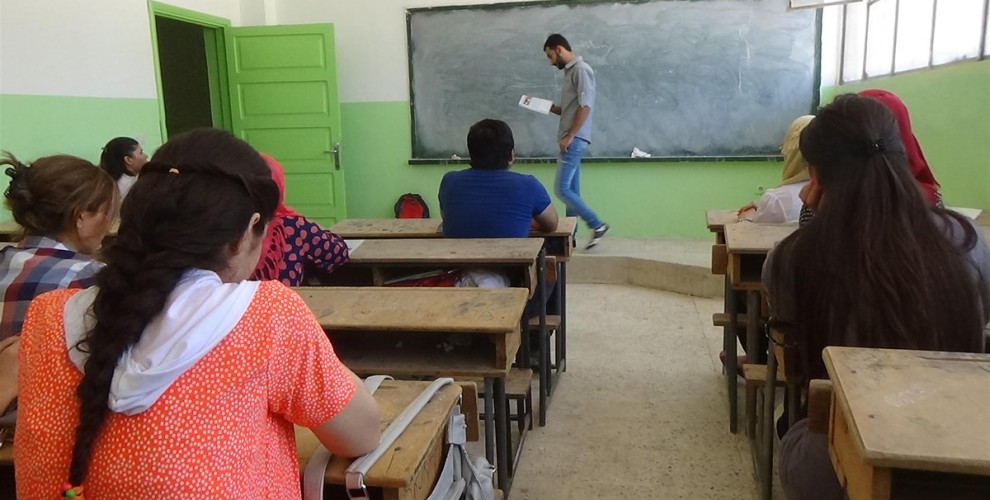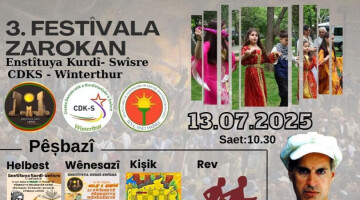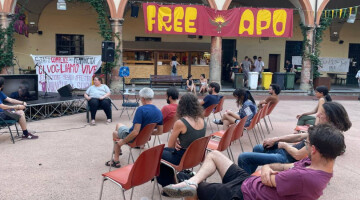Rojava Kurdistan has created an important distinction in the region with multilingual education; the languages of the peoples ignored and assimilated by the Baath regime for years have received a lifeline.
Kurdish, Assyrian and Turkmen languages that were facing a threat of extinction under the assimilation, have risen from their ashes once more.
The United Nations (UN) had announced in previous statements that many languages faced extinction under the hegemony of other languages. The UN statement said that 97% of the world’s population used just 4% of the living languages, and one local language was getting lost every 2 weeks.
The Kurdish language, spoken by a 50 million population, is among the languages under danger of extinction. The Kurdish language had a lead in the disappearing languages, but it can be said that this status has changed somewhat with the developments following the Rojava revolution. The Kurdish language is fighting extinction through academies and schools founded in Rojava.
THERE IS A FIGHT, AND ALSO A DANGER OF EXTINCTION
The Kurdish people resisted the assimilation policies implemented by the Turkish, Arab and Persian states within their means. But despite this, for decades, the Kurdish language was subjected to oppression, exploitation and assimilation by the Turkish, Arab and Persian nationalisml in Kurdistan, fragmented into four pieces by the Treaty of Lausanne. And this continues even today.
Translating the works of Kurdish scholars like Elî Herîrî to Feqiyê Teyran, Ehmedê Xanî to the Bedirxan family, Cegerxwin to Osman Sabri since the Gutis, the efforts have kept one of the most ancient languages, the Kurdish language alive, but any further advancement, however small, has been difficult.
The Kurdish language could advance only after the emergence of the PKK. This advancement of the Kurdish language continued every year since at a level that surpassed the last.
THE KURDISH LANGUAGE PROTECTED THROUGH THE REVOLUTIONARY FIGHT
After the Treaty of Lausanne, the Kurdish language and its dialects were attempted to be portrayed as dialects of Persian in Iran, Turkish in Turkey, and Arabic in Syria and Iraq. But the Kurdish people knew that such attempts by the hegemonic powers were just smoke and mirrors. Following the emergence of the PKK, the Kurdish people managed to protect their essence, and embraced the Kurdish language and its dialects more.
There have been more efforts for the protection and advancement of Sorani, Loranî and Hewramani in Iran, Sorani and Gorani in Iraq, Kurmanci in Syria and Kurmanci and Zazaki in Turkey since.
THE ROJAVA REVOLUTION AND EDUCATION
The popular insurgencies that broke out in Syria in 2011 evolved into a civil war with the intervention of foreign powers and regional accomplices.
The Kurdish people saw this practice put forth by the foreign powers and their regional accomplices and developed policies in this basis. The Kurdish people made opportunities out of the situation, and realized a revolution that started from Kobanê and spread all over Rojava’s cities and villages on July 19, 2012.
After the revolution, the Rojava cantons formed to meet the needs of the peoples fought the gang groups like ISIS, Al Nusra, Ahrar Al Sham and Sultan Murat Brigade on one hand, and built the social life on the other. In all three cantons of Rojava, the educational institutions offered a new model for education.
In Rojava cantons’ institutions for education that did away with the monist education system of the Baath regime, education is in Kurdish, Arabic, Assyrian, Turkmen and other languages when necessary. These educational institutions constitute a model for the Middle East with its mosaic of peoples and languages, and thousands of teachers trained in the academies teach tens of thousands of students in their native tongues.
KURDISH EDUCATION ACADEMIES AND SCHOOLS FOUNDED
To build the social life, the Institution of Kurdish Language (SZK) started opening Kurdish schools and trained thousands of Kurdish language teachers.
As the SZK fine tuned the education system in Rojava, the Kurdish language was made official in all schools in Rojava. The chauvinist curriculum of the colonialist Baath regime was changed. Several academies and institutes were founded. There, teachers were trained for the development of the Kurdish language. On August 11, 2013, the first language and literature academy was opened in Efrîn under the name Martyr Ferzat Kemenger.
With the Kurdish language education, teachers who could serve in the region’s schools were trained. Under the lead of the SZK and Rojava Teachers Union, the first Kurdish Language and Literature Institute was opened on October 28, 2013 under the name Martyr Viyan Amara.The SZK opened the Celalet Bedîrxan Academy for language, history and Kurdish literature in Qamishlo on October 24, 2013. Later, a Martyr Viyan Amara Institute was also opened in Kobanê.
By the beginning of 2015, several institutes were founded with the perspective of the democratic nation. Efforts in this line continue everywhere in Rojava. Many thought academies have also been founded. On August 29, 2013 in Cizîr canton, the Nûrî Dêrsimî Academy for Science and Enlightenment was founded. Later it was renamed to the Academy of Science and Free Thought.
Several branches emerged in the Cizîr canton under the academy. Many people went through these academies and received an education through the perspective of the democratic nation. On April 4, 2013, the Mesopotamia Social Science, Law and Justice Academy opened in Qamishlo.
On February 24, Kurdistan Strategic Research Center was founded in Qamishlo. This center was later renamed to Rojava Strategic Research Center. In every province of Rojava, Centers for Arts and Culture were opened. All institutions continue their cultural development, as if in defiance to the past oppression.
EDUCATION IN KURDISH AND ARABIC
The most important pillar of the revolution in Rojava based on the principle of democratic autonomy has been education in the mother tongue.
The language education efforts that were conducted in secret in private homes during the Baath period have now reached thousands of teachers, hundreds of schools and tens of thousands of students in Kobanê center and surrounding villages. As the Turkish state’s intolerance towards the Kurdish language continues, the democratic autonomy understanding took root in Rojava in a very short while, and the schools teach in Kurdish and Arabic.
The Institution of Kurdish Language founded in Kobanê in 2012 with the Rojava Revolution started their education efforts with one teacher and 12 students, and now there are some 200 schools, 2000 teachers on duty, and 30 thousand students in the city center and villages.
7 SCHOOLS FOUNDED FOR ARABS TEACHING IN ARABIC
Some schools teach in Arabic, while only one course is in Kurdish. In villages with Arab and Kurdish populations, the Kurdish students are educated in Kurdish and Arab students in Arabic, and all students learn Arabic and Kurdish. The curriculum according to grades is as follows:
1st and 3rd grades are taught in Arabic or Kurdish, they also take mathematics, music, arts and sports.
4th and 5th grades are taught in Arabic or Kurdish, they also take science (zanyarî), social studies, mathematics, music, arts and sports.
6th grade and high school students are taught in Arabic or Kurdish, they also take mathematics, science (zanyarî), physics, chemistry, democratic nation studies, geography, music, arts and sports. They can take English and French as foreign languages.
EDUCATION IN TURKMEN LANGUAGE
Before the ISIS gangs looted the area, there were said to be 65 thousand Turkmens in Raqqa in general and 35 thousand in Girê Spî alone. Even though they are Turkmens, they speak Arabic because the Baath regime didn’t allow them to learn their own language.
With the Rojava revolution, different ethnic and faith groups have also come back to life and reached a level to sustain their own culture, language, identity and faith. One of these people are the Turkmens.
Last year, the Girê Spî Democratic Society Education Committee took another step to strengthen the Rojava revolution and organized a special education for the Turkmen youth. Last year, the Turkmen education committee demanded this and thus for the first time in Rojava Kurdistan, a track was opened for Turkmen language, history and culture.
In Girê Spî, there are classes of mathematics, geography, history, arts, music, language and sports as well as education in Turkmen. The Arab students are also taught the Turkmen language.















